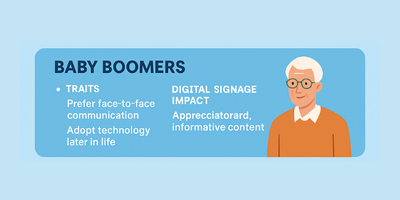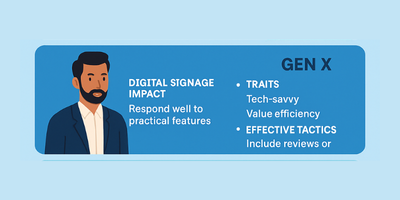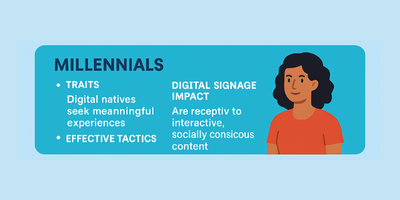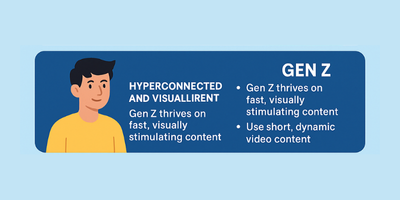
Digital signage—dynamic, digital displays used for marketing, communication, and engagement—has become a cornerstone of modern advertising and customer interaction. However, the way it resonates with each generation varies based on their preferences, habits, and familiarity with technology. Let’s explore how Baby Boomers, Gen X, Millennials, and Gen Z respond to digital signage and how businesses can tailor content for each group.
|
Baby Boomers (Born 1946–1964): Familiarity with Tradition, Openness to Tech

Traits:
-
Prefer face-to-face communication
-
Value clarity, trust, and professionalism
-
Adopted technology later in life
Digital Signage Impact:
Baby Boomers tend to appreciate digital signage that is straightforward and informative. They may not be drawn to flashy animations or rapid content changes but will respond well to clear messaging, large fonts, and practical information (e.g., directions, schedules, promotions). In retail or healthcare settings, digital signage can improve trust and reduce confusion when it’s designed for accessibility and usefulness.
Effective Tactics:
-
Use large, readable text and high-contrast visuals
-
Highlight value, benefits, and reliability
-
Avoid slang or overly trendy visuals
Generation X (Born 1965–1980): Skeptical but Tech-Savvy

Traits:
-
Adapted to technology during adulthood
-
Value efficiency, authenticity, and independence
-
Often decision-makers in households
Digital Signage Impact:
Gen X responds well to digital signage that respects their intelligence and time. They appreciate convenience, such as real-time updates or interactive directories in malls or airports. Messaging that aligns with their pragmatic mindset—showing solutions rather than hype—is most effective.
Effective Tactics:
-
Use practical, time-saving features (e.g., self-service kiosks)
-
Include reviews or social proof to validate messaging
-
Focus on value and functionality
Millennials (Born 1981–1996): Digital Natives with a Cause

Traits:
-
Grew up with the internet and mobile technology
-
Seek meaningful experiences and social responsibility
-
Value personalization and instant access
Digital Signage Impact:
Millennials are highly receptive to digital signage, especially when it’s interactive, personalized, or socially conscious. They respond to visually engaging content, QR codes, and real-time social media integrations. Businesses that use signage to highlight values, deals, or engagement opportunities tend to win over Millennials.
Effective Tactics:
-
Integrate social media feeds or user-generated content
-
Promote brand values (e.g., sustainability, inclusivity)
-
Use vibrant visuals and motion graphics
Generation Z (Born 1997–2012): Hyperconnected and Visually Oriented

Traits:
-
Grew up fully digital and mobile-first
-
Short attention spans, but high media fluency
-
Expect interactivity, authenticity, and speed
Digital Signage Impact:
Gen Z thrives on fast, visually stimulating, and interactive content. They expect digital signage to feel like an extension of their smartphone experience. Brands that employ gamification, augmented reality, or interactive displays capture their attention most effectively.
Effective Tactics:
-
Use short, dynamic video content
-
Incorporate touchscreens, gamified ads, or filters
-
Keep content fun, relatable, and authentic
The Key Takeaway
Digital signage is a powerful communication tool—but it isn’t one-size-fits-all. Each generation engages with digital displays in different ways, shaped by their life experiences and technological fluency. Businesses looking to maximize the impact of digital signage should:
-
Segment content by location or audience type
-
Adjust tone, visuals, and interactivity to match generational preferences
-
Blend digital signage with mobile engagement to bridge gaps across age groups
Understanding these differences allows brands to craft smarter, more inclusive strategies that make digital signage more than a display—it becomes a bridge between generations.
Explore itouchinc.com for more information on our solutions or contact us for needs unique to your property or project.
|


